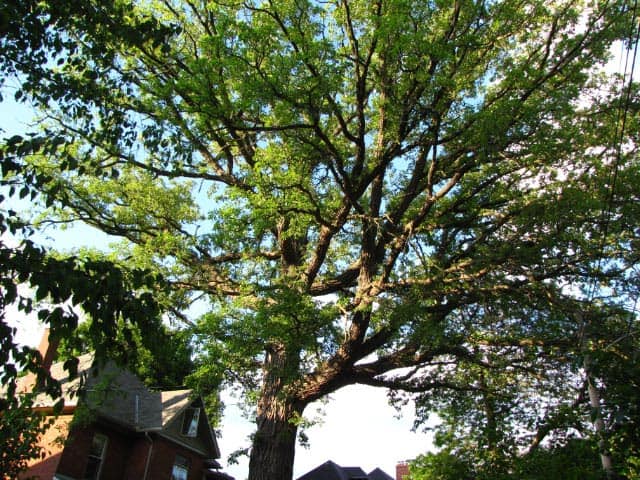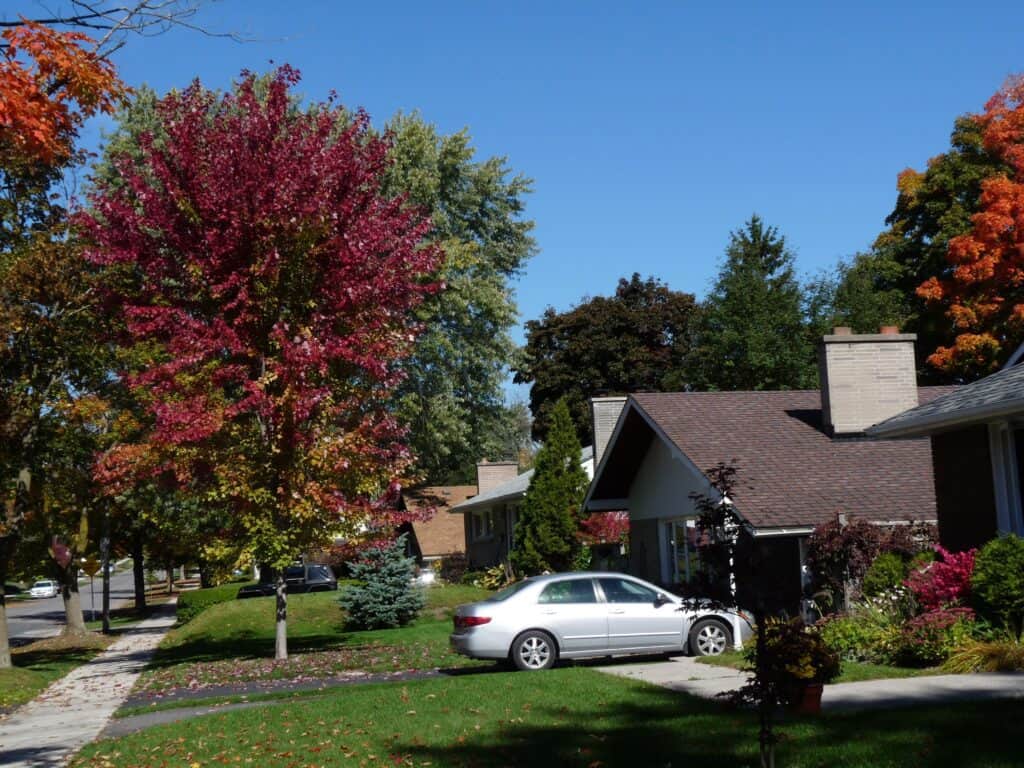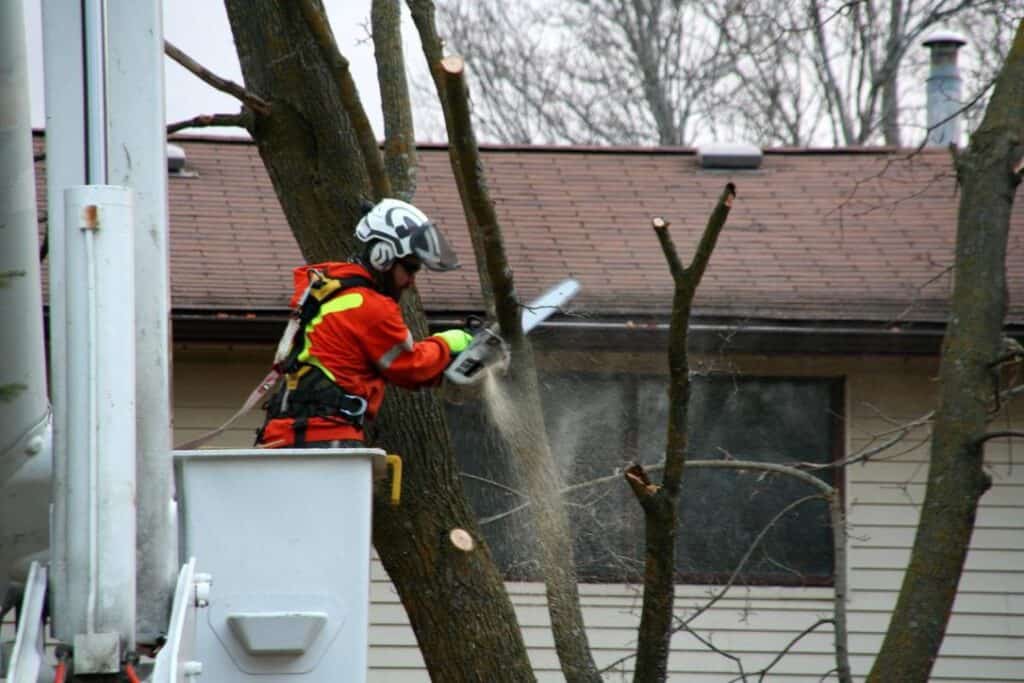Trees are important in fighting climate change. You can register for a free tree for your city yard.
Peterborough Examiner – April 22, 2022 – by Drew Monkman
As we celebrate another Earth Day, I’d like to turn my attention this week to trees and what you and your family can do to enhance our urban forest. We all know that trees play an important role in mitigating climate change by storing carbon. But what exactly is this role and what can individuals do to help trees thrive in our communities and backyards? To explore these questions, 4RG Meets (a monthly For Our Grandchildren event) invited Cathy Dueck to share the knowledge she has gained from a lifetime of learning about and advocating for trees. Dueck is a teacher of environmental education at Trent University, coordinator of the Pathway to Stewardship and Kinship environmental education program, and founder of Peterborough’s Ecology Park. Here’s some of what she had to say.
Carbon sequestration
Currently, about 36 billion tons of carbon dioxide (CO2) are being emitted annually into the global atmosphere by burning fossil fuels. The concentration (parts per million or ppm) of atmospheric CO2 has increased dramatically from about 280 ppm in pre-industrial times to a record 420 ppm just two weeks ago. About half has been emitted in only the past 30 years. Rising CO2 means more global heating and climate chaos ahead.
Through photosynthesis, trees remove CO2 from the air. Some of the carbon is stored in tree tissues, while some is released through respiration and when the tree dies and decomposes.Surprisingly enough,only about half is stored in tree tissues like leaves, branches, trunk, and roots. The rest is sequestered underground in partially decomposed organic material (humous) and in organisms such as bacteria and mycorrhiza fungi living in the soil around the tree. Trees have a symbiotic relationship with these fungi, some of which actually colonize the tree’s root system.

Can trees make a difference?
Of the 36 billion tons of annual emissions, how much can trees sequester? How effective are they as a “carbon sink?” Global Forest Watch estimates that our planet’s forests absorb about 7.6 billion tons of CO2 annually, which is about a quarter of annual emissions. So, what if we just plant more trees?
A 2019 study (Bastin et al) claimed that planting trees on all available land worldwide could store 752 billion tons of carbon at maturity. Therefore, many governments like Canada’s announced plans to plant billions of trees. The study, however, came in for a lot of criticism because many untreed areas are unsuitable for tree growth and the long-term survival rate is low. Trees, of course, face the worsening threats of wildfires, insect infestations, deforestation, and extreme climate events like drought.

The scientific consensus now is that we must prioritize the protection and restoration of both existing forests and other natural carbon sinks like wetlands and grasslands. We should also be encouraging crop-tree systems in agriculture (mixing trees and crops) and increasing the tree canopy in urban areas. By implementing “natural climate solutions” such as these, it is estimated that somewhere between three and 18 billion tons of additional CO2 could be sequestered annually.
The local picture
In just the past five years, Peterborough has lost 10 percent of its urban forest canopy from development and the removal of trees that have succumbed to urban stresses and insects like the emerald ash borer. Also, for the last two years, there was no urban tree removal by-law which led to the loss of many trees. As of 2020, the amount of land covered by trees in Peterborough stood at about 27 percent. Of this, 80 percent was on private land. This means that most of the responsibility to increase the canopy lies in private landowners’ hands. The City itself has actually done a great deal in restoring the canopy and substantially increased its tree-planting budget.

How you can help
Dueck believes we should strive for an urban canopy covering 40 percent of the city and prioritize trees that are native to Ontario. Some hardy non-natives, however, should also be part of the mix. Conserving and enhancing medium-aged and old trees is also extremely important.
Trees do best in low-stress locations such as backyards. If you need to plant in a high-stress area such as a boulevard, she recommends small species such as serviceberry and flowering crab-apple; medium-sized trees like hackberry, gingko, and Kentucky coffee tree; and large trees like bur oak (her favourite), Freeman maple, honey locust, and silver maple. If you’re planting in a low-stress area, the range of choices is much greater.
As for tree planting basics, Dueck stresses the importance of a wide, shallow hole, mixing compost with the original soil, providing about four inches of mulch, removing grass in a wide ring around the tree, and watering regularly, preferably with a drip hose.
We should also keep in mind that a healthy urban forest canopy reduces the “urban heat island effect” by shading concrete and asphalt surfaces. This in turn means lower energy consumption for summer cooling.
A special tree event
If you would like to learn more about planting and caring for trees as well as their role in the fight against climate change, a special “Trees for Canopy Conservation” event is being held at Beavermead Park. It takes place on Saturday May 14 from 9 am to 3 pm. Hosted by the City of Peterborough and For Our Grandchildren (4RG), it is also in memory of 4RG member Jessica Dalliday and her baby, Angeline. This is an event for the whole family with entertainment by the Paddling Puppeteer, face painting, crafts, and more!
As part of the City’s commitment to replace the many trees lost in our urban canopy, you can receive a free tree for your private Peterborough property. All you need to do is register online at https://www.peterborough.ca/en/news/trees-for-canopy-conservation-free-tree-giveaway.aspx Any changes regarding the event will also be provided at this link. . Be sure to act quickly because the quantity of trees is limited.
As Dueck reminded everyone at the end of her presentation, “Planting trees is a fantastic thing to do for many reasons, but planting AND caring for all trees is even better.” Clearly, trees are only part of the solution to climate change and drastically reducing emissions right now must remain the priority. With a provincial election in June, please consider which party is offering the best emission reduction plan before casting your ballot.
CLIMATE CHAOS UPDATE
Alarm: The latest UN climate report says huge carbon emission cuts are still needed. We have the technology, but the necessary reductions are not being made. Unless countries step up their efforts to cut emissions, the planet will, on average, be 2.4 to 3.5 C warmer by 2100. This is far above the 1.5 C level at which climate-related risks to human health, livelihoods, food security, and general well-being will all increase dramatically. See https://tinyurl.com/245rf4kj
Upcoming events: On May 9 from 7 to 8 pm, Deborah Pearson will speak at 4RG Meets. She will explain how to make your yard more resilient to weather extremes and discuss practices to support biodiversity and reduce your carbon footprint. Register by emailing 4rgmeets@gmail.com.
Carbon dioxide: The atmospheric CO2 reading for the week ending April 16 was a record-high 420.16 parts per million (ppm), compared to 419.00 ppm just one year ago. The highest level deemed safe for the planet is 350 ppm. The steady upward trend in atmospheric CO2 continues: Pre-industrial (280 ppm), 1912 (300), 1988 (350), 2010 (390), 2014 (400), and 2020 (413).
Take action: To see a list of ways YOU can take climate action, go to https://forourgrandchildren.ca/ and click on an ACTION button.